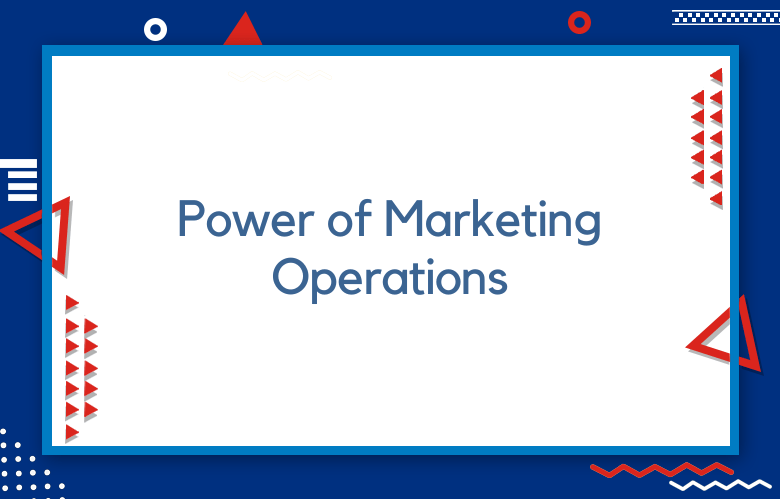The Power of Marketing Operations (MarkOps)

Marketing operations, commonly known as MarkOps, is a necessary discipline that helps businesses achieve effective and efficient marketing activities. It is a strategic function that enables marketers to optimize their campaigns while ensuring their business goals are met.
Many organizations have realized the potential of MarkOps and how it can significantly contribute to their growth. We look at the power of Marketing Operations and why it is crucial in today’s competitive business world.
Marketing has evolved significantly in recent years. Traditional marketing approaches are no longer as practical as they used to be. To stay competitive in today’s fast-paced digital world, businesses must be agile, data-driven, and customer-centric.
This is where marketing operations, or MarkOps, come into play. While marketing is all about creativity, MarkOps is a systematic approach to managing marketing activities, making the creative process more effective and efficient. We’ll explore the power of MarkOps and how it can help businesses achieve better results.
What is Marketing Operations (MarkOps)?
Marketing Operations (MarkOps) is a strategic approach encompassing the planning, execution, and measurement of marketing activities. It integrates technological systems, data analytics, and process optimization to streamline marketing workflow.
MarkOps enhances marketing efficiency by improving cross-functional collaboration and aligning marketing activities with business goals.
MarkOps is a relatively new field that emerged as a response to the increasing complexity of modern marketing.
It addresses the challenges of the digital age, such as the rise of omnichannel marketing, the proliferation of marketing technologies, and the explosion of data. MarkOps offers a cohesive framework for managing marketing operations across channels, platforms, and campaigns.
The Importance of Marketing Operations
Marketing operations play a vital role in the success of any business. At its core, marketing operations are streamlining and optimizing marketing strategies, processes, and technologies.
This includes planning and executing marketing campaigns to leveraging data analytics to drive meaningful insights and results.
A well-structured marketing operations function can provide businesses with numerous advantages, one of which is improved efficiency and cost-effectiveness.
By implementing best practices and innovative technologies, marketing operations teams can streamline processes and eliminate unnecessary steps, ultimately saving the company time and money.
Moreover, marketing operations also play a significant role in delivering a more personalized and engaging customer experience. With advanced data analytics and customer profiling, marketing operations teams can gain insight into customer behaviors, preferences, and interests.
This allows businesses to craft highly targeted and tailored marketing campaigns that resonate with their audience and drive meaningful engagement.
How Marketing Operations Drive Success
Marketing operations refer to the tactical processes and activities that enable marketing teams to operate efficiently and effectively.
Marketing operations are crucial in driving business success. They involve executing marketing campaigns, managing data and analytics, and facilitating cross-functional collaboration.
A well-planned marketing operations strategy can significantly impact business success and the bottom line. It can help to streamline and optimize marketing workflows, improve campaign performance, enhance customer engagement, and boost ROI.
Marketing operations also facilitate marketing alignment with other departments within the organization, such as sales, product development, and customer service, to ensure a cohesive and seamless customer experience.
Exploring the Role of Marketing Operations
Marketing Operations (MO) is a discipline that streamlines marketing processes and enhances efficiency. Ensuring marketing activities align with business objectives while managing resources effectively is crucial.
MO has emerged as a strategically important function in recent years owing to the transformational impact of digital technologies on modern marketing practices.
MO offers a holistic view of marketing activities while improving stakeholder collaboration, such as marketing teams, analytics teams, creative agencies, and external vendors.
It aims to provide a standardized and efficient way of executing marketing campaigns across different channels while maintaining brand consistency.
The role of MO is not limited to executing marketing campaigns but also focuses on optimizing processes that help achieve better outcomes.
Why Marketing Operations is Essential for Business
Marketing Operations are an integral component of any modern business strategy. They are the backbone that supports the planning, execution, and analysis of all marketing efforts.
This department works behind the scenes to ensure that all marketing campaigns are successfully executed, on budget, and on time while tracking and analyzing the results of all marketing activities.
Many companies use digital technologies to create marketing campaigns in the current business environment.
Proper marketing operations management can help businesses make the most of technology, analytics, and automation to optimize their marketing processes and quantify their marketing outcomes.
Marketing Operations oversees the entire marketing department’s performance, ensuring it harmoniously runs towards the same objectives.
Marketing executives often lean on performance analytics to decide where to allocate their budgets, and marketing operations offer them the resources and systems needed to obtain precise measurements of marketing effectiveness.
The Link Between Strategy and Marketing Operations
The connection between strategy development and successful marketing operations must be balanced. A solid marketing strategy helps to clarify business goals and identify target customers while providing a framework for formulating and executing successful marketing initiatives.
A great marketing strategy is essential to the overall success of any organization, and it is necessary to align marketing operations to support the business’s comprehensive strategic initiatives.
Developing a practical and relevant marketing strategy requires an in-depth understanding of the customer and market landscape.
In addition, a comprehensive analysis of the company’s internal and external environments is required to develop effective strategies to meet established business objectives. Once a marketing strategy has been created, marketing operations supporting it must be implemented.
This includes identifying and targeting the ideal customer segments, creating compelling advertising and messaging, and creating an effective marketing program.
The Impact of Marketing Operations on Business Efficiency
Marketing operations are crucial to any organization’s overall business efficiency and success.
It involves various processes such as research, analysis, planning, implementation, and monitoring of marketing campaigns and strategies to attract and retain customers, create brand awareness, and increase sales revenue.
The impact of marketing operations on business efficiency can be seen in several ways. Effective marketing operations can help businesses identify and understand their target audience, preferences, needs, and purchasing behavior.
This insight enables businesses to create tailored marketing strategies that resonate with their audience, leading to increased brand recognition and customer loyalty and ultimately driving business growth.
Leveraging Marketing Operations for Effective Campaigns
Leveraging Marketing Operations for Effective Campaigns is a proven strategy that has helped businesses achieve successful campaigns.
In today’s world, the competition for market share is fierce, and organizations must adopt innovative methods to differentiate themselves from their rivals.
This is where marketing operations come into play. A well-structured marketing operations team can help organizations optimize their marketing processes, improve efficiency, and drive revenue growth.
From forecasting and budget allocation to campaign execution and analysis, a well-functioning marketing operations team can benefit any organization significantly.
Marketing operations teams can provide invaluable support regarding campaign execution by managing the entire process. This includes everything from pre-campaign planning to post-campaign analysis, ensuring that each process step is optimized for the desired outcomes.
They can also facilitate smooth communication between the various campaign teams, including sales, marketing, and creative teams, ensuring everyone is on the same page and working towards the same objectives.
Ensuring Brand Alignment through Marketing Operations
Effective marketing operations are pivotal in ensuring brand alignment across all touchpoints.
This involves a comprehensive understanding of the brand’s message, values, and attributes that resonate with the target audience. Moreover, it requires a deep knowledge of market trends and consumer preferences to create marketing campaigns that align with the brand’s image.
To achieve brand alignment through marketing operations, organizations should have a well-defined process that involves cross-functional teams, including marketing, sales, product development, and customer service.
These teams can collaborate to create marketing campaigns that deliver the right message at the right time to the right audience.
Companies should also leverage the latest marketing technologies to automate certain process aspects, such as campaign implementation, data analysis, and performance tracking.
Maximizing Lead Generation with Marketing Operations
Marketing operations are the backbone of lead generation for any business and, hence, play a critical role in driving profitability and growth.
Maximizing the efficiency of marketing operations is a multifaceted process that involves utilizing cutting-edge technology, adhering to best practices, and staying abreast of evolving industry trends.
One of the critical aspects of effective marketing operations is data-driven decision-making. By leveraging advanced analytics and machine learning, businesses can glean insights into their customer base, identify high-value segments, and optimize their targeting and messaging strategies accordingly.
This ensures marketing efforts are directed toward the right audience and helps minimize costs and maximize ROI.
Another critical component of lead generation is effective campaign management. This involves implementing a robust marketing automation system that enables businesses to orchestrate complex marketing workflows and track their performance in real time.
Companies can efficiently nurture leads and move them further down the sales funnel using automated tools such as email marketing, SMS messaging, and social media advertising.
Analyzing Data for Better Marketing Strategies with Operations
In today’s rapidly evolving business landscape, it has become more critical than ever for companies to stay ahead of the curve regarding marketing strategies.
A key component to achieving this goal is analyzing data effectively and using the insights gained to make informed decisions about the most effective tactics for driving growth and revenue.
By leveraging data analytics tools and platforms, companies can gain valuable insights about customer behavior, market trends, and overall business performance.
This information can then be used to optimize marketing campaigns, identify new growth opportunities, and make strategic product development and distribution decisions.
Measuring Performance for Marketing Analytics
Measuring performance for marketing analytics is an indispensable practice for any organization that seeks to stay ahead of the competition. In today’s data-driven world, marketers must gather and analyze data diligently to obtain meaningful insights and make informed decisions.
To achieve this, organizations can use various metrics and Key Performance Indicators (KPIs) to measure the success of their marketing activities, whether through social media campaigns, email marketing, or search engine optimization (SEO).
For instance, in social media marketing, metrics such as engagement rate, reach, impressions, and click-through rate (CTR) are essential to measure the effectiveness of your strategy.
Similarly, in email marketing, metrics such as open rate, click-through rate, conversion rate, and bounce rate can help you assess the performance of your email campaigns.
Convolutional Networks for Marketing Analytics
Convolutional Networks, also known as ConvNets, are neural network architecture types that have gained significant interest and popularity in marketing analytics.
This is due to their ability to learn complex patterns in data, making them well-suited for tasks such as image and text classification, sentiment analysis, and customer segmentation.
The architecture of ConvNets is based on convolution, a mathematical operation that involves sliding a small filter over an input tensor to extract features. The filter weights are learned through backpropagation, which adjusts the network weights based on the error between the predicted and actual outputs.
Residual networks for Marketing Analytics
Residual networks, or ResNets, are a famous deep learning architecture that has produced remarkable results in various computer vision tasks.
However, ResNets have also proven highly effective in Marketing Analytics applications and have become a go-to method for improving predictive models and extracting valuable insights from vast data.
The core idea behind ResNets is to introduce skip connections between layers of a neural network, which allows information to flow directly between layers.
This approach helps overcome the vanishing gradient problem that often occurs in deep neural networks. The gradients become very small as the network deepens, making it challenging to train the web effectively.
By utilizing skip connections, ResNets are better equipped to maintain the strength of the gradient and enable the neural network to learn more effectively.
Graph Neural Networks for Marketing Analytics
Graph Neural Networks (GNNs) are a set of machine learning algorithms that are designed to work with graph structures. These algorithms are instrumental in marketing analytics, where data is often naturally represented as a graph.
As the name suggests, a GNN takes a graph as input and produces a graph as output while applying some transformation to the nodes and edges of the input graph.
Marketing is an industry where data is crucial in understanding and serving customers in a better way.
Data such as customer behavior, channel preference, purchase history, and demographic information can be seen as a graph structure in which customers are represented as nodes, and the relationships among them are represented as edges.
This rich and complex data structure makes it challenging to analyze and extract valuable insights using conventional methods.
Unsupervised learning for Marketing Analytics
Marketing analytics collects and analyzes data related to a company’s marketing efforts to gain insights into customer behavior and preferences.
One branch of marketing analytics is unsupervised learning, which involves analyzing large amounts of data without prior knowledge or guidance.
This approach is beneficial in discovering hidden patterns or anomalies that may take time to be apparent through manual analysis or supervised learning methods.
Unsupervised learning algorithms use various techniques to find patterns in data, including clustering, dimensionality reduction, and anomaly detection.
Clustering involves grouping similar data points based on shared characteristics, such as customer demographics or purchasing habits.
Dimensionality reduction techniques help to simplify complex datasets by identifying the essential features or variables, and anomaly detection methods flag unusual or unexpected data points that may warrant further investigation.
Conclusion:
As marketing becomes increasingly complex and competitive, marketers must streamline their processes, measure their efforts, and collaborate more effectively. This is where MarkOps comes in.
With its focus on process optimization, effective measurement, analysis, better collaboration, leveraging marketing technologies, and strategic direction, MarkOps is an essential function for modern marketers.
By implementing MarkOps, businesses can achieve better marketing outcomes and drive growth in today’s rapidly changing business environment.
In conclusion, MarkOps is becoming increasingly important in today’s fast-paced digital world. It is a systematic approach to managing marketing activities that optimize processes to produce the best results.
By focusing on process efficiency, driving better ROI, improving cross-functional collaboration, leveraging technology to drive innovation, and driving continuous improvement, MarkOps can help businesses achieve better results and stay competitive.
Call: +91 9848321284
Email: [email protected]



